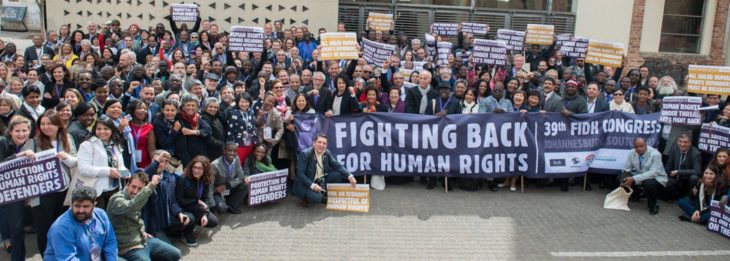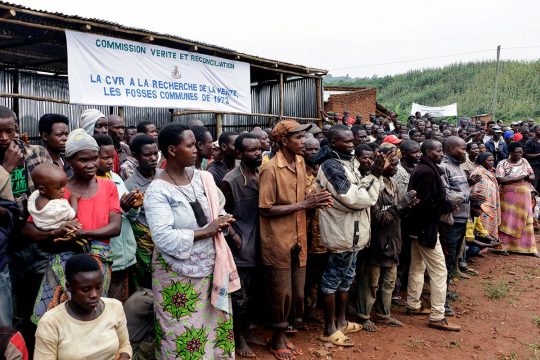Burundi and South Sudan were a central focus of discussions at the 39th World Congress of the International League for Human Rights (FIDH), which took place from August 23 to 27 in Johannesburg, South Africa. Among the “urgent resolutions” adopted by the federation’s 178 member organizations, two concern Burundi and South Sudan specifically. FIDH appeals to the UN and the African Union to act, urging international justice to prosecute grave crimes committed in both countries.
Urgent action is needed, according to FIDH. The organization’s congress called on International Criminal Court (ICC) Prosecutor Fatou Bensouda to “open with no further delay an investigation into crimes committed in Burundi since April 2015 that fall under the Court’s jurisdiction” and “make public statements on the progress of the preliminary examination opened on 25 March 2016 and on the conclusions of this examination”.
Burundi has for the last year been plunged into a deep political crisis that stemmed from President Pierre Nkurunziza’s decision to run for a third term in office, which he got for himself in July 2015. The crisis has already left 500 people dead and the UN refugee agency UNHCR estimates that some 270,000 Burundians have fled the country since last year.
The FIDH Congress urged the United Nations Security Council to “create a Commission of inquiry to investigate serious human rights violations perpetrated in Burundi since the outbreak of the crisis, mandated by the Secretary General of the United Nations and supported by the African Union”.
The Burundian government, which has suspended almost all independent media, forced a number of journalists and human rights activists into exile and refuses any negotiation with the opposition, seems determined to pursue its intransigent line all the way.
Another urgent resolution of the FIDH congress is on South Sudan, where fighting broke out from July 8 to 11 in the capital Juba between troops loyal to President Salva Kiir and rebels supporting Vice-President Riek Machar. These clashes left nearly 300 people dead and some 80,000 displaced. Human rights organizations have also signalled rape of women and girls and other forms of sexual violence said to have been perpetrated by soldiers in uniform and armed men in civilian clothes, including near United Nations compounds.
Hybrid Court for South Sudan
The FIDH congress in Johannesburg urged the UN Security Council and the African Union to “support the prompt and effective establishment of the accountability mechanisms provided for in the Agreement on the Resolution of the conflict in the Republic of South Sudan (ARCSS)”. The ARCSS was concluded in August 2015 between the government and the opposition led by Riek Machar, and allowed the setting up of a transitional national unity government. It provides notably for the creation of a hybrid court and a truth commission in line with the standards of international human rights and criminal law.
Unlike Burundi, South Sudan is not a party to the Treaty of Rome that founded the International Criminal Court.
Another more general “urgent” resolution on justice in Africa addresses difficult relations between the African Union (AU) and the ICC. It calls on the AU to “acknowledge that the International Criminal Court and the African Union have common interests with regards to the fight against impunity for international crimes in Africa and that a majority of its Member States have ratified the Rome Statute, and therefore cooperate with the Court”.
“React to ICC reports on Darfur”
Whereas there were fears of a mass withdrawal of African States from the ICC at the last AU summit in Kigali in July, this idea met with opposition from some capitals and was withdrawn from the agenda.
In this third resolution, the FIDH also calls on the UN Security Council to “react to the ICC reports addressing the situation in Darfur and take all necessary measures following the decisions of non-cooperation delivered by the ICC”. Fatou Bensouda accuses the Security Council of doing nothing to get the arrest of Sudanese President Omar Al Bashir, who is under two longstanding ICC arrest warrants for grave crimes committed in Darfur, western Sudan. The situation in Darfur was referred to the ICC by the UN Security Council in its Resolution 1593 of March 31, 2005.







